10 Ways to Get Back into the (Tabletop) Game
 |
| You remember these right? |
Role-playing games are a bit harder to get started on than some hobbies. You have to meet up in person, find a table, and go someplace where you won’t get reported as a terrorist for talking about stabbing people for hours. There’s also a fairly brutal life curve: when you are young it’s hard to find places to play, but you have lots of time; when you get old(er) you have places to play, but little time to spare.
You also usually need to find at least three people to play with, which I have difficult at times. People move away, get jobs with weekend hours, and RPGs tend to be a hobby that people “grow out of.” I have friends who have played in the same groups for decades, but I’ve also had at least three generations of gaming groups fall apart due to life pressures. Nothing dramatic, but more the sort of centrifugal force of family life and responsibilities that go with adulthood. Demographically, way more people enjoy things based on RPGs or products that grew out of RPGs (Magic the Gathering and Munchkin, for instance) than actually play the games anymore; this is despite the fact that it’s easier to game now than ever. Forming a gaming group is hard work and there’s no easy way to do it. But it can definitely be worth the effort and it can pay back ten times over with fun. So why not try it out?
Here are ten suggestions for ways of getting back into RPGs:
1. Do Your Research
The good: Lets say you’ve heard of role playing games but haven’t opened a book since the ’80s (oh my god, did I just sound old? Should I say ’90s? Let’s go with ’90s). You want to run an RPG and you don’t know how to get started, or even what’s out there on the market right now. The great news is it’s no longer the ’90s and there are a ton of resources available FOR FREE out on the Internets to get you up to speed. YouTube has TableTop (Wil Wheaton’s show on Geek & Sundry), and On the Table (Ok, we could get a little more creative with these names, guys). Or if you are into podcasts, check out RPGpodcasts.com for a listing of podcasts covering everything from old school D&D to something called “Postcards from a Dungeon” (which I’m sure is not nearly as sexy as it sounds). Or just Google whatever game you used to play and see if there is a new edition available. Much like Hollywood, there is nothing an established gaming company loves more than rebooting a franchise (over and over and over again).
There are even interviews with game designers!
The bad: Well, learning is fundamental and everything but this step won’t literally get you into a game, just give you some good background. Also, you know, you might stream a lot of videos on your phone and cut into your data plan. Plus if someone else is watching a movie or something like that, you could run low on bandwidth. These are the sort of risks you face. Make me proud.
2. Get Behind the Gamemaster Screen
The good: Assuming you already know some people who want to play and have the time, but there just hasn’t been anyone to carry the banner of roleplaying to the central part of you and your friends’ lives, then you, (yes, you!) can take up the proud mantle of Gamemaster. Some of the suggestions from step one might help you get started, but if you have a modicum of know-how and the inclination, you can get into tabletop gaming for little or no investment. For instance, Pathfinder, which is either the number one or number two RPG in the U.S. market, has basically all of their rules posted for free under the Open Game License. FATE, a little RPG system that has picked up a lot of steam in recent years, has a ‘pay what you think it’s worth’ set up. And if you don’t mind investing some pocket change, you can either check DrivethruRPG for a huge collection of POD and PDF games or the standbys of eBay and Amazon on the cheap.
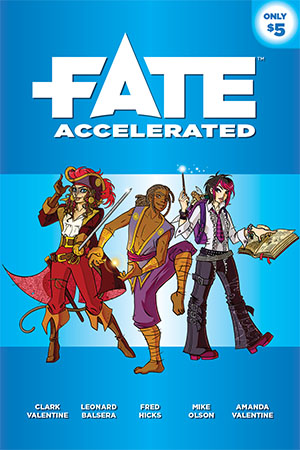 |
| See? Only $5, easy to learn, and highly entertaining. You’re welcome. |
The bad: Well, if most people reading this had a convenient RPG-friendly posse on hand I imagine this list would be pretty short. In my experience, you can want to run a game all you like, but if you don’t have bodies in the seats you’re like a Ryan Reynolds movie. Which is to say, no one is there to play the game. Kind of like Blade Trinity had no plot. Zing!
3. Check Out Meetup.com
The good: This can be a great way to meet people. The easiest method here is to look for some role-playing enthusiasts within an easy drive of your location. If you’re like me, you’ll get tempted to sign up for stuff miles and miles away, but the commute is rarely worth it, so stick close to home. Find groups with a lot of members and events in a public place, and give it a shot! The first gaming group I joined mostly served as a mouthpiece for other events, but I’ve met several friends through the LA/OC group Dead Gamer’s Society. If you can’t find any you like, you can always make your own, too.
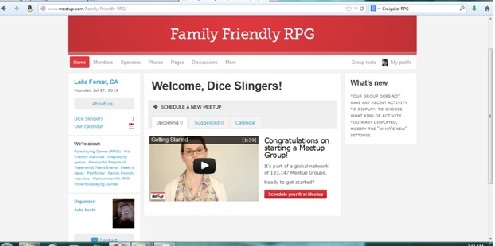 |
| Like this one we set up! It was easy! |
The bad: Meetup is sort of like the beach. You can stand there on the sand and look out at the waves breaking and have a good time, but you might not want to think about the fact that maybe a mile out the sand drops off and suddenly there’s this big abyss full of sharks and weird aquatic things. Why is that like Meetup? Well, if you search for things you like, you can meet like-minded people and have a great time. On the other hand, if you go down the wrong rabbit trail, you’ll find all sorts of strangeness. Otherkin and fetishists, sure, but also people obsessed with meditation, astrology, exercise AND tech (has to be both), the Microsoft Store, certain breeds of dogs, certain kinds of exercise, gardening…I once saw a group of women who were devoted to hating Hooters waitresses. It pretty much never ends, and you can go as far down the rabbit hole as you want. Not that that’s necessarily a problem for the average reader on this site.
4. Look up Manufacturer Websites
The good: I have found this method to be a bit of a crapshoot over the years, but most manufacturers of roleplaying games will have at least a forum where you can look for other players. Some, like Steve Jackson Games, keep up a searchable database of players and GMs. This can be good because role players, like most geeks, love to divide off into small groups that hate one another. This has not been helped in recent years, where D&D, the Coke of Roleplaying, released a new edition that was considered by some to be the New Coke of Roleplaying and by others to be, uh, the Crystal Pepsi of Roleplaying (People like Crystal Pepsi, right?), and then they decided to go back to something like the old edition, which is either Coke Classic or, well, New Coke again, I guess. The point is that roleplayers hate change and by going straight to the manufacturer you don’t accidentally play the wrong game or version of the game.
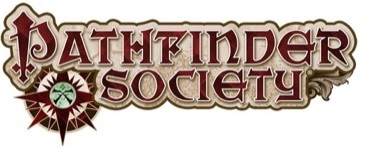 |
| Some companies even have official minions who’d be happy to help you find a game. |
The bad: This is basically the opposite of Meetup. While on Meetup, you are guaranteed to have lots of people in your area, but they may not care about your actual hobby, whereas on a specific game website you have plenty of people interested in your actual hobby, but they may all live in Russia under house arrest for meeting the gaze of Putin, or whatever happens in Russia. Also they are smaller groups and not as oriented towards meeting in nice safe places first so you might end up waking up in a bathtub of ice missing a kidney if you’re not careful, although the likelihood is much higher that you’ll just end up meeting some of the weirder gamers out there.
5. Find a Gaming Club
The good: Here is a way to absolutely guarantee you can play a game, unless you live on a mountain or are one of those people under house arrest (in which case, ??????! Don’t you love Putin?). Basically, there are large collectives of gamers, closely allied with the manufacturers of the games they play, who put on events and things throughout the country. They run games at local game stores and conventions, and you can find events on sites like Warhorn, D&D Encounters, etc. These games are organized and governed by central authorities, so you can expect recourse if you have any issues and that the games will generally run on time. They often get access to the good stuff first (Encounters is currently play testing fifth edition D&D) and most of them will let have an ongoing character and participate in a much larger story. They also serve as the one night stand of gaming as you can play as often as you like with very little obligation unless you happen to make friends there.
The bad: Well, one of the good and the bad things of roleplaying is the openness to ideas. For instance, you might want to play a game about time-traveling cyborgs who ride around on dinosaurs and fighting vicious zombie emu. There are some game masters who could make this happen, though I’m not sure how many could pull it off. However, the organized groups tend to only run pre-made scenarios. These may be relevant and well-written since someone got paid to write them up, but on the other hand, it will never be terribly inventive. Also, if you like high-powered games, you should be warned some societies tend to limit high level play. Finally, paperwork. You have to deal with registrations and I.D.s and stuff, which brings a whole “DMV” aspect that just seems out of place, unless your time-traveling cyborg is renewing the registration on his rocket-powered triceratops.
6. Attend a Gaming Convention
The good: It’s possible to meet a gaming group through a con, though in my experience you should expect to go regularly for a while first (if there are any extroverted gamers out there, ignore that part). Cons are fun just on their own for the general con experience, and there are certainly lots of people there. Plus you can try out many different GMs on the same day/weekend, which is pretty efficient compared to how long it would take normally. You also won’t have people thinking they should make plans around you or get stuck in a group that you sort of hate since no one expects you to stick around. This gives you freedom, which is power. And knowledge is power. So it makes you smart, too! Finding a local convention usually takes little more than a quick Google search, but looking for flyers at your local gaming or comic book store is a pretty good way to go.
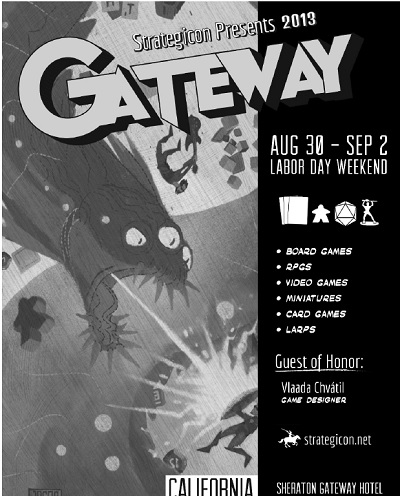 |
| Flyers will look something like this |
The bad: Well, most people going to a con are going there to do con stuff. Which is to say that they might not be looking for a long-term romance, more of a one night stand of gaming. They may be from far away (though not under house arrest, since they’re at the con) and that might not work (my wife and I once totally hit it off with some gamers only to find out they were from Arizona). They might be at con to get a break from their huge gaming group that is rife with rivalries and old grudges. Lastly, GMs don’t always run games the same at con they do for their regular group, either better due to preparation or worse due to being very tired. So of the suggestions on this list, it’s more of a long shot than most. Although it has the big bonus of being fun and satisfying its own right. Your local gaming convention is no Comic-Con and it probably never gets on the news, but it’s still a great time, even if people do forget to eat, sleep, and shower.
7. Try Gaming on Internet Forums
The good: Well, let’s say you like a bunch of different games or some game that is so obscure they can’t even manage a web presence. Or you have some pathological hatred of the official manufacturers due to their shutting down your fansite with mean lawyers. You could sign up for a site like rpg.net and be independent! They are agnostic as to game systems, plus you can game online. This is a place where I honestly am behind the tech curve due to liking in-person gaming, but I know people who have success with Skype and Google Hangout among other places. People also just post turns on a forum, which is great for scheduling or for people under house arrest as you can work it around your normal life.
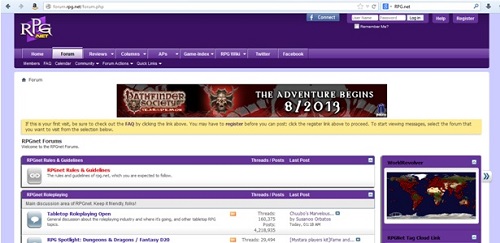 |
| RPG.net is pretty good place to start |
The bad: Most forums have their own mini cultures, and you may be judged harshly if you are not in compliance. You may get dozens of replies or none, depending on how people judge your requests to play or if you post at the right time. Although I know people who enjoy playing by forum post, given the number of verbal exchanges in something like a combat round it seems like it must be a positively glacial method of play. You also lose the in-person aspect, which could make things a bit more distant and preserve Internet anonymity, which can be a bad thing for some people. Online play can get a tad strange, though this is more of a chat thing than a forum thing, or so is my understanding of the stereotypes involved.
8. Open Gaming at Your Friendly Local Game Store
The good: Fifteen years ago there were a dozen game stores within an hour of my house. I had my pick, but the quality was hit or miss. Some were dirty, stinky and full of employees who thought their job was to game and look at Magic the Gathering Cards, enough that this became the stereotype. These days, game stores in general are more rare, but in my experience friendlier and a lot more helpful. They also look less like basements and more like real businesses. It can be a hard choice between supporting your FLGS (Friendly Local Game Store) and just buying on Amazon sometimes, but there’s one thing they do very well, which is bring gamers together. Most gaming stores have a list of local games, and many of them host gaming at least once a week and sometimes longer-term games as well. They also provide space to play, which can be critical.
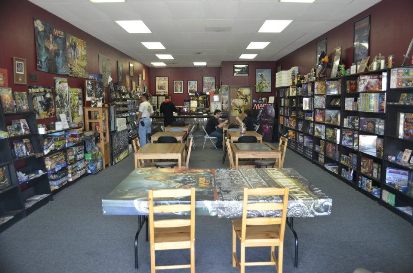 |
| See? Nothing like a basement (Photo courtesy of DiceHouse Games in Fullerton, CA) |
The bad: You don’t have to be under house arrest to have trouble finding an FLGS. They may all be closed, or you may have an owner who passed through the hard times for game stores despite his fundamental dickishness and now uses it as a reinforcement for said dickishness (dickitosity?). Here you have a very small, but potentially very good pool of people who both game and live near you, but they may not need players or they may hate your favorite game. You never know how many people look at your actual ad, or if you might as well stuff your game request in a bottle and drop it off a boat. Preferably a yacht.
9. Try Craigslist
The good – I know a few people who sell goods on Craigslist. Once when I got really irritated with finding a place to rent I found a good one on Craigslist that was only slightly crime-ridden. (Our neighbors got broken into once, but the rent was so low! It was awesome! This is not a joke, I mean it!) It has a large pool of people, and you can find some really funny posts, especially the really pathetic ones in Missed Connections (I bought a latte, you blew your nose and it was so beautiful – I can only hope you read this ad and contact me, I was the college student in the corner quietly crying to myself). I don’t know any reason why you would have any bad results from posting an ad on Craigslist, though if you aren’t under house arrest you might want to make sure you meet in public (to be serious for a moment, this is ALWAYS the best idea). Also, if you are very clear in your ad, people probably won’t think you’re selling drugs.
The bad – Craigslist used to be just one of those things the media didn’t understand except that it was high tech. However, in recent years, it’s become clear to everyone that it’s mostly about prostitutes and drugs and murdering people. Sorry, that’s a stereotype; the murdering part is exaggerated by the media. But basically, the potential creepiness of Craigslist makes Meetup.com look like amateurs. It doesn’t have to be that way, and plenty of non-creepy people probably log on to Craigslist every day to read weird postings and look for naked pictures before going on to do something useful with their lives. But it could be an issue. Assuming you’re not a murderer. Not that there’s anything wrong with that; this list is a no-judging zone.
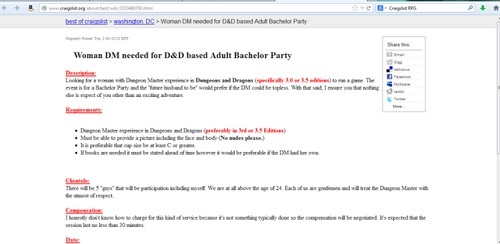 |
| Nothing creepy going on here. (See that URL? This happened. For real.) |
10. Start a Facebook Group
The good – Let’s say you’ve come this far in the article and have now amassed a huge group of followers. Er, players, I mean. You want to keep things organized and make sure there aren’t any creepers around. My personal preferred tool is Facebook Groups. Here you can set up a secret group, invite only the relevant players, and keep a running discussion of the game. This can be good to get bookkeeping done between games, to keep up a running journal for players that miss sessions due to illness/vacation/house arrest /etc, and just generally keep in touch. People are busy these days and something like this can help a lot.
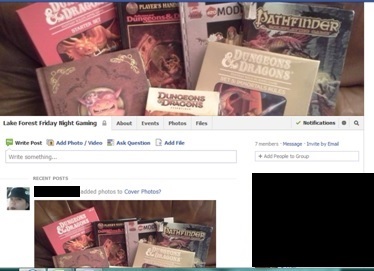 |
| We make a lot of these. It’s kind of addicting. |
The bad – You need players and all the other things covered above first. You need to make sure not to get too controlling or obsessive about your gaming Groups. You also need to not log on to check your Groups and end up sucked into following people’s feeds or that little stalker box off to the right that shows you everything they’re doing. Facebook can be habit-forming and may cause you to waste even more time on the internet. It can also be awkward when dealing with people who don’t like Facebook or are afraid of computers, although those people are silly. Note – please do not print this email and give it to someone who does not have a computer. That would be hurtful to all involved.
Previously by David N. Scott:
Ten Things We Learned Attending L.A. By Night: The Grey Ghost Masquerade
Five Games Masters and Players You See at Every RPG Con
Eight Reasons You Should Care About the World of Darkness Reboots
